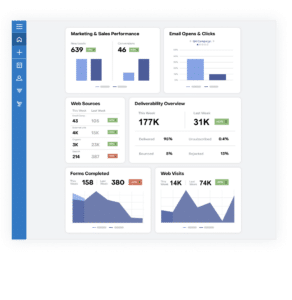Marketing Automation for Manufacturers: 6 Ways Companies are Benefiting
Manufacturing companies have been trying to figure out ways to automate their processes for years. Automation, whether it’s to manage the front and back-office processes with an ERP or track customer relationships with a CRM, has been driving the improvement of the manufacturing industry.
However, with new technology available for the shop floor and in the factory, manufacturers have the opportunity to improve their sales and marketing processes and alignment with even more automated processes. In fact, according to recent SugarCRM research, the top reported technology integrated with CRM is marketing automation and email marketing (46%), with one-third saying that collecting customer feedback to align marketing and sales strategy is a key priority.
Is Automating Your Marketing Strategy the Way to Go?
The answer is simple – yes! The truth is, there is less time these days for labor-intensive marketing methods such as direct mail, tradeshows and printed brochures and catalogs. We’re not saying get rid of those things altogether. But it’s time to adopt a new digital strategy for the manufacturer’s sales and marketing programs. Manufacturing Global recently reported the top revenue driver for manufacturing companies is to create a brand strategy that differentiates your product from your competitors. In fact, with the right tools, some manufacturing companies are landing quote requests from their first email send. However, a lack of marketing resources can prevent manufacturers from achieving these goals.
According to Aberdeen, firms that use marketing automation improve lead conversions 107%, have a greater average deal size of 40%, have a 20% higher attainment quota, and 17% better forecast accuracy. Here are some of the ways we’re seeing manufacturers benefit from marketing automation this year.
6 Ways Manufacturing Companies are Benefiting from Marketing Automation
1. CRM Integration
Integrating marketing automation with your CRM enables you to learn more about your customers. CRM integration eliminates manual processes and aligns marketing with sales around a streamlined process. By centralizing customer data, CRM integration allows for personalized marketing campaigns tailored to individual customer profiles and behaviors. Automation streamlines lead management processes, from lead capture to nurturing and conversion, ultimately improving overall efficiency and effectiveness.
In other words, integrating your CRM with your marketing efforts (i.e. marketing automation solution) makes it easier to share data across all business units.
2. Understanding Buyer Personas
Buyer personas help marketers create the ideal strategy and specific campaigns to drive your leads through the buyer’s journey. For manufacturers, understanding these personas is essential for developing targeted marketing strategies. Marketing automation tools track and analyze customer interactions across various touchpoints, helping to identify common traits and behaviors among different buyer segments.
Since Manufacturers may have several different buyer personas, it’s important to remember that even with B2B sales, you’re selling to a person too. You need to personalize your campaign to target different buyers within your industry. Marketing automation tracks engagement to help define buyer personas.
3. Personalization
We’re talking about giving your readers personalized, targeted, relevant information. In order to market to your buyer personas, you must first establish trust. With marketing automation, marketers in the manufacturing industry can use forms, content, and workflows to determine their visitor’s persona, current challenges, and where they are in the buyer’s journey.
On top of traditional personalization practices, Generative AI has recently become a hot topic in all mediums, from business settings to casual conversations. And this has happened for a good reason. For marketers, generative AI poses incredible potential because it offers opportunities for more complex and personalized campaigns in all their forms. From shaping the buying experience to lifecycle marketing and digital experiences, Machine Learning and AI have entirely changed how marketing departments operate.
4. Lead scoring
Lead scoring helps ensure that your sales team gets the most qualified leads. This is a major benefit, especially for manufacturing firms with sales forces or channel partners.
Marketing automation platforms assign scores to leads based on various criteria, such as demographic information, behavior, and engagement level. By implementing lead scoring, manufacturers can ensure that their sales teams are focusing their time and resources on leads with the highest potential value, maximizing efficiency and productivity.
5. Reporting
Reporting and analytics are essential components of marketing automation, providing insights into the performance and effectiveness of marketing campaigns. Marketing automation platforms generate detailed reports on key metrics, such as campaign ROI, conversion rates, email engagement, and website traffic. These reports provide manufacturers with detailed KPIs on the performance of each campaign by channel so you know what’s working and where improvements can be made.
6. Measuring ROI
One of the main challenges for any manufacturer is measuring its return on investment from marketing campaigns. Think about all the money spent on “mandatory” trade shows and print campaigns … not to mention the budget allocated to digital marketing.
Marketing automation platforms enable manufacturers to track the impact of their marketing activities on revenue generation, customer acquisition, and overall business growth. By accurately measuring ROI, manufacturers can allocate resources more efficiently, justify marketing expenditures, and optimize their strategies to achieve better results over time.
Revolutionizing Manufacturing: Investing in the Power of Marketing Automation
There is still quite a bit for marketing and sales to figure out in order for manufacturers to continue their growth. With better and more implemented technology, manufacturers can spend more time on the shop floor or in the factory focusing on what they’re best at.
Automated tools help ensure they don’t have to worry about keeping up with paperwork, stuffing envelopes for direct mail campaigns, etc. Marketing automation is just one more vehicle that will improve efficiency and help drive campaigns and communication in order for everyone to move in the same direction and achieve their goals.
Want to learn more about the in’s and out’s of marketing automation and the benefit’s it could bring to your organization? Check out our recent guide, The 2024 Marketing Automation Buyer’s Guide.
